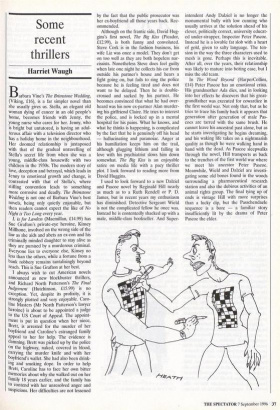Some recent thrillers
Harriet Waugh Barbara Vine's The Brimstone Wedding, (Viking, £16), is a far simpler novel than she usually gives us. Stella, an elegant old woman dying of cancer in an old people's home, becomes friends with Jenny, the young nurse who cares for her. Jenny, who is bright but untutored, is having an adul- terous affair with a television director who has a holiday home in the neighbourhood. Her doomed relationship is juxtaposed with that of the gradual unravelling of Stella's secret life from when she was a young, middle-class housewife with two children in the 1930s. The modern story of love, deception and betrayal, which leads in Jenny to emotional growth and change, is contrasted with that of Stella's, where stifling convention leads to something more corrosive and deadly. The Brimstone Wedding is not one of Barbara Vine's best novels, being only quietly enjoyable, but then readers cannot expect the like of No Night is Too Long every year.
L is for Lawless (Macmillan, £14.99) has Sue Grafton's private-eye heroine, Kinsey Millhone, involved on the wrong side of the law as she aids and abets an ex-con and his criminally minded daughter to stay alive as they are pursued by a murderous criminal. Everyone lies to everyone else, Kinsey no less than the others, while a fortune from a bank robbery remains tantalisingly beyond reach. This is Sue Grafton at her best.
I always wish to cut American novels announced as new blockbuster thrillers, and Richard North Patterson's The Final Judgement (Hutchinson, £15.99) is no exception. Yet, despite its prolixity, it is strongly plotted and very enjoyable. Caro- line Masters (Mr North Patterson's lawyer heroine) is about to be appointed a judge to the US Court of Appeal. The appoint- ment is put in question when her niece, Brett, is arrested for the murder of her boyfriend and Caroline's estranged family appeal to her for help. The evidence is damning. Brett was picked up by the police on the highway, naked, covered in blood, carrying the murder knife and with her boyfriend's wallet. She had also been drink- ing and smoking dope. In order to help Brett, Caroline has to face her own bitter memories about why she walked out on her family 18 years earlier, and the family has to contend with her unresolved anger and suspicions. Her difficulties are not lessened
by the fact that the public prosecutor was her ex-boyfriend all those years back. Rec- ommended.
Although on the frantic side, David Hug- gins's first novel, The Big Kiss (Picador, £12.99), is both funny and convoluted. Steve Cork is in the fashion business, his wife Liz was once a model. They don't get on too well as they are both hopeless nar- cissists. Nonetheless Steve does feel guilty when late one night he collects his car from outside his partner's house and hears a fight going on, but fails to ring the police because he is feeling tired and does not want to be delayed. Then he is double- crossed and sacked by his partner. He becomes convinced that what he had over- heard was his now ex-partner Alan murder- ing his girlfriend Claire. He tries to interest the police, and is locked up in a mental hospital for his pains. What he knows, and what he thinks is happening, is complicated by the fact that he is genuinely off his head — hallucinating and paranoiac. Anger at his humiliation keeps him on the trail, although glugging lithium and falling in love with his psychiatrist slows him down somewhat. The Big Kiss is an enjoyable satire on media life with a pacy thriller plot. I look forward to reading more from David Huggins.
I used to look forward to a new Dalziel and Pascoe novel by Reginald Hill nearly as much as to a Ruth Rendell or P. D. James, but in recent years my enthusiasm has diminished. Detective Sergeant Wield is not the complicated fellow he once was. Instead he is contentedly shacked up with a male, middle-class bookseller. And Super-
intendent Andy Dalziel is no longer the monumental bully with low cunning who usually arrives at the solution ahead of his clever, politically correct, university educat- ed under-strapper, Inspector Peter Pascoe. Instead he is a lovable fat slob with a heart of gold, given to salty language. The ten- sion in the way the three characters used to mesh is gone. Perhaps this is inevitable. After all, over the years, their relationship was likely to mature into bofing ease, but I miss the old team.
In The Wood Beyond (HarperCollins, £14) Peter Pascoe has an emotional crisis. His grandmother Ada dies, and in looking into her effects he discovers that his great- grandfather was executed for cowardice in the first world war. Not only that, but as he tries to trace his family back it appears that generation after generation of male Pas- coes are tarred with the same brush. He cannot leave his ancestral past alone, but as he starts investigating he begins dreaming, and his waking life takes on a nightmarish quality as though he were walking hand in hand with the dead. As Pascoe sleepwalks through the novel, Hill transports us back to the trenches of the first world war where we meet his ancestor Peter Pascoe. Meanwhile, Wield and Dalziel are investi- gating some old bones found in the woods surrounding a pharmaceutical research station and also the dubious activities of an animal rights group. The final tying up of ends is vintage Hill with more surprises than a lucky dip, but the Passchendaele sequence is a bore — a familiar story insufficiently lit by the drama of Peter Pascoe the elder.


























































 Previous page
Previous page